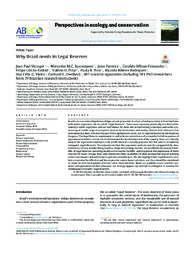Why Brazil needs its Legal Reserves.
Why Brazil needs its Legal Reserves.
Autoria: METZGER, J. P.; BUSTAMANTE, M. M. C.; FERREIRA, J. N.; FERNANDES, G. W.; LIBRÁN-EMBID, F.; PILLAR, V. D.; PRIST, P. R.; RODRIGUES, R. R.; VIEIRA, I. C. G.; OVERBECK, G. E.
Resumo: Brazil's environmental legislation obliges private properties to retain a fixed proportion of their total area with native vegetation, the so-called ?Legal Reserves?. Those areas represent practically one third of the country's native vegetation and are well known for their role in biodiversity protection and in the provisioning of a wide range of ecosystem services for landowners and society. Despite their relevance, this instrument has been criticized by part of the agribusiness sector and its representatives in the Brazilian Congress. The Legal Reserve requirement is said to be too restrictive and to impede the full expansion of agricultural activities, and thus to be detrimental for the development of the country. Here, we critically analyze the arguments employed in the justification of a recently proposed bill that aims to completely extinguish Legal Reserves. We demonstrate that the arguments used are mostly unsupported by data, evidence or theory, besides being based on illogical reasoning. Further, we synthesize the principal benefits of Legal Reserves, including health and economic benefits, and emphasize the importance of these reserves for water, energy, food, and climate securities, in addition to their primary function of assisting in the maintenance of biodiversity in agricultural landscapes. We also highlight that Legal Reserves are a key-component for effective and less expensive nature-based solutions, and thus should be considered as assets for the development of Brazil rather than liabilities. Based on available sound scientific evidence and agreement on their relevance, we strongly oppose any attempt to extinguish or weaken the maintenance of Brazil's Legal Reserves.
Ano de publicação: 2019
Tipo de publicação: Artigo de periódico
Unidade: Embrapa Amazônia Oriental
Observações
1 - Por padrão são exibidas publicações dos últimos 20 anos. Para encontrar publicações mais antigas, configure o filtro ano de publicação, colocando o ano a partir do qual você deseja encontrar publicações. O filtro está na coluna da esquerda na busca acima.
2 - Para ler algumas publicações da Embrapa (apenas as que estão em formato ePub), é necessário ter, no celular ou computador, um desses softwares gratuitos. Sistemas Android: Google Play Livros; IOS: iBooks; Windows e Linux: software Calibre.
Acesse outras publicações
Acesse a Base de Dados da Pesquisa Agropecuária (BDPA) para consultar o acervo completo das bibliotecas da Embrapa.

